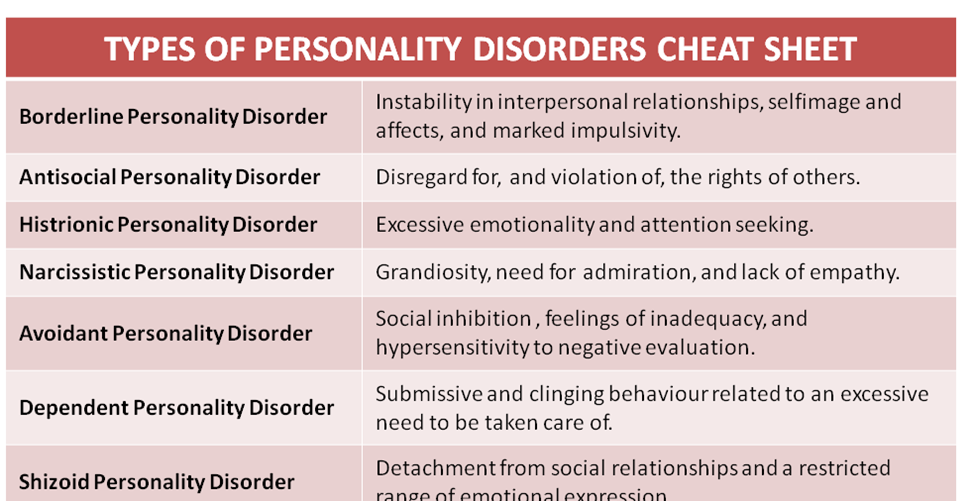Michelle complains to the night nurse that the staff on the day shift don't like her. She continues to tell the nurse that she is the best nurse on the unit because she is always caring and kind. The nurse informs Michele that she will be on vacation for the next week. An hour later. Michelle is found cutting her wrists with a plastic knife. Which personality disorder would you suspect Michelle has?
Histrionic
Obsessive compulsive
Narcissistic
Borderline
The Correct Answer is D
A. Histrionic Personality Disorder:
Individuals with histrionic personality disorder typically seek attention and may be overly dramatic, but self-harm as a response to perceived abandonment is not a characteristic feature.
B. Obsessive-Compulsive Personality Disorder (OCPD):
People with obsessive-compulsive personality disorder are characterized by perfectionism, preoccupation with details, and a desire for control. Michelle's behavior, including self-harm in response to perceived rejection, aligns more closely with borderline personality disorder.
C. Narcissistic Personality Disorder:
While narcissistic individuals may exhibit a sense of superiority and a desire for admiration, self-harm in response to abandonment is not a typical trait of narcissistic personality disorder.
D. Borderline Personality Disorder (BPD):
This personality disorder is characterized by unstable relationships, self-image, and emotions. Individuals with BPD may have intense fears of abandonment and engage in impulsive and self-destructive behaviors. Michelle's perception of being disliked, her claim of superiority, and the self-harming action in response to news of the nurse's vacation are consistent with BPD.

Nursing Test Bank
Naxlex Comprehensive Predictor Exams
Related Questions
Correct Answer is C
Explanation
A. Favoring clients over others based upon their mental health diagnosis is not an indication of bias: This statement is incorrect. Favoring or discriminating against clients based on their mental health diagnosis is a clear indication of bias, and it is an issue that the nursing profession aims to address.
B. Displaying basis & conscious art: It seems like there might be a typo in this option. Assuming it means "Displaying bias, conscious or not," this could be a relevant point in discussing unconscious biases that individuals may hold, impacting their interactions with clients.
C. There is a negative stigmatization for mental lives: This is the correct answer. This statement acknowledges the existence of negative stigmatization associated with mental health. Addressing and reducing mental health stigma is an essential aspect of providing quality mental health care.
D. Bias is often isolated to inpatient hospitalization: This statement is not accurate. Bias can manifest in various healthcare settings, not just inpatient hospitalization. It is important to address bias across all levels of care to ensure equitable and unbiased treatment for individuals with mental health concerns.
Correct Answer is B
Explanation
A. These programs help clients correct distorted body image:
While behavioral programs may incorporate components related to body image, the primary focus is often on addressing and modifying specific behaviors associated with eating disorders, such as binge eating, purging, or restrictive eating.
B. These programs help clients manage uncontrollable behaviors:
This is the correct answer. Behavior modification programs aim to address and modify specific behaviors that contribute to eating disorders. This can include establishing healthier eating patterns, reducing binge-purge cycles, and promoting more adaptive coping strategies.
C. These programs allow clients to maintain control:
While the concept of control is relevant to eating disorders, behavior modification programs are designed to help clients gain control over maladaptive behaviors and establish healthier patterns. It's not about maintaining control over the disorder itself.
D. These programs address underlying client anger:
While emotions, including anger, may play a role in eating disorders, behavior modification programs are more focused on targeting and modifying specific behaviors rather than addressing underlying emotions directly. Emotional aspects may be addressed through additional therapeutic interventions
Whether you are a student looking to ace your exams or a practicing nurse seeking to enhance your expertise , our nursing education contents will empower you with the confidence and competence to make a difference in the lives of patients and become a respected leader in the healthcare field.
Visit Naxlex, invest in your future and unlock endless possibilities with our unparalleled nursing education contents today
Report Wrong Answer on the Current Question
Do you disagree with the answer? If yes, what is your expected answer? Explain.
Kindly be descriptive with the issue you are facing.
